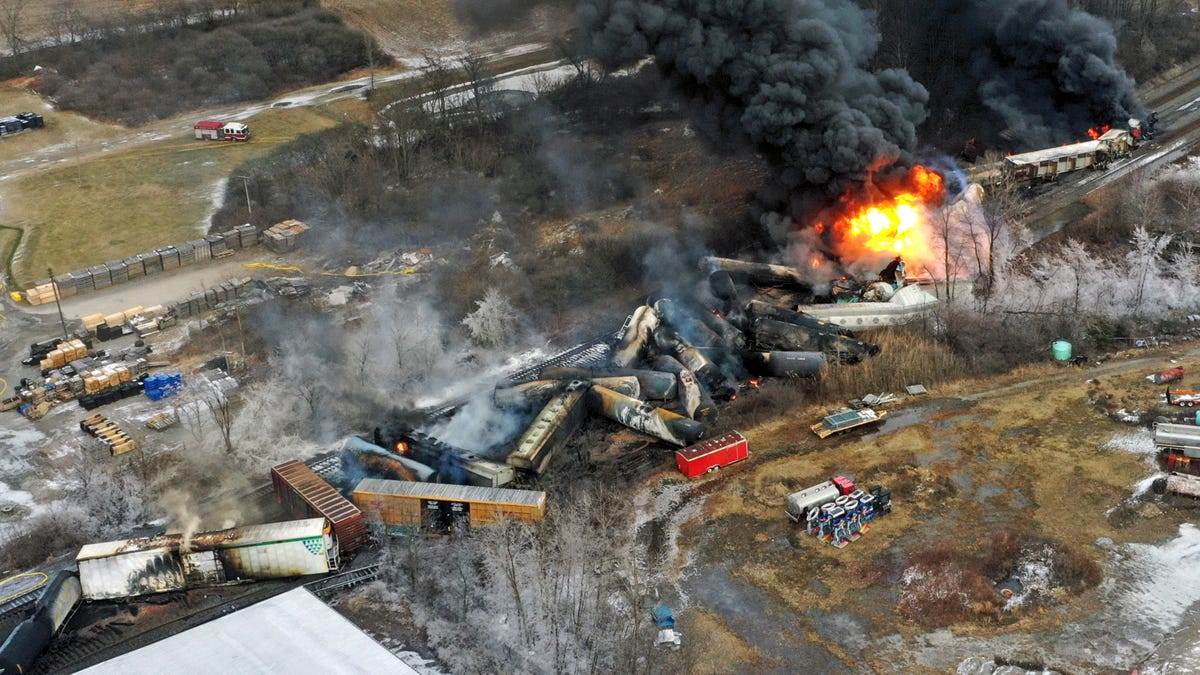
The fallout from last month’s disastrous train derailment in East Palestine, Ohio is still unfolding. The Environmental Protection Agency continues to oversee clean-up efforts, is still struggling to find suitable treatment sites for contaminated waste water, and is conducting some ongoing environmental monitoring and reporting.
Yet amid those touted efforts, the agency itself has faced flack. Some locals and researchers have criticized the EPA for being slow to act. Others have pointed out the agency’s reluctance to carry out certain testing. Then, there’ve been critiques of the subsequent lack of transparency surrounding those test results.
Advertisement
Now, the federal agency’s own internal watchdog, the EPA Office of Inspector General, has taken notice. The OIG has launched an investigation into the EPA’s response in East Palestine. The announcement was made quietly, on Monday, via a short memo posted to the OIG’s website.
“The U.S. Environmental Protection Agency Office of Inspector General is initiating an inquiry into the EPA’s response to the February 3, 2023 train derailment in East Palestine, Ohio,” the notice says. “As part of this inquiry, we will conduct interviews, gather data, and analyze a variety of issues, including hazardous waste disposal, air and water monitoring, soil and sediment sampling, and risk communication.”
Advertisement
Advertisement
Why, exactly, the probe was initiated is unclear. Earther reached out to the EPA’s press office for more information but didn’t receive a response at of time of publication. Yet the investigation follows weeks of pushback and doesn’t come as any particular surprise.
In addition to the critiques from local residents and health experts, concerns over how the EPA has handled things in East Palestine have also come from both sides of the political aisle. Right-wing politicians and pundits have jumped on the opportunity to lambast the federal response and blast the Biden administration (even though Trump spearheaded freight deregulation that likely contributes to the danger of train derailments). Meanwhile, Democratic senators have tried to push the EPA to offer more extensive testing.
Advertisement
For many, the Inspector General probe is likely a welcome relief. The investigation is “warranted,” Kyla Bennett, a former EPA researcher who now works for the nonprofit group Public Employees for Environmental Responsibility, told The Guardian. “There are too many unanswered questions and conflicting information,” she added. The watchdog office’s assessment “can get to the bottom of how decisions were made to conduct testing the way they were and whether that was sufficient,” Bennet further told the outlet.
However, the EPA has repeatedly and publicly defended its management of the East Palestine disaster. On Tuesday, both federal and state EPA officials testified before Congress. At that hearing, the agency’s regional director, Debra Shore, told legislators that the EPA is using some of the most powerful tools it has available to hold Norfolk Southern accountable for its failure. Shore also highlighted the EPA’s past and ongoing testing and monitoring efforts.
Advertisement
State officials additionally came to the federal agency’s defense. “U.S. EPA has brought the most sophisticated technology available to continually monitor and ensure that the air we are all breathing in is Palestine is safe,” Anne Vogel, Ohio’s EPA director, said during the hearing. “In direct response to community feedback, we have undertaken a robust soil sampling effort.”
Certainly, the EPA has done a lot in the aftermath of the chemical spill and controlled burn that forced East Palestine residents to evacuate, killed an estimated 43,000 animals, and has left a whole community with lingering health concerns. But has it done enough? Through the OIG probe, we’ll get another opinion.
Services Marketplace – Listings, Bookings & Reviews